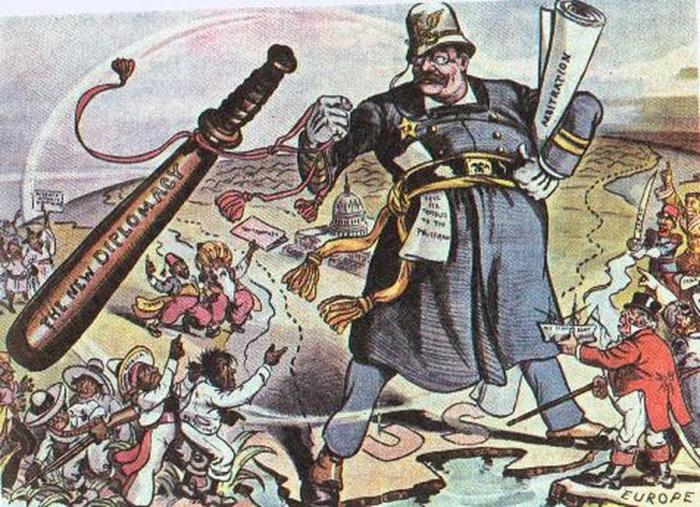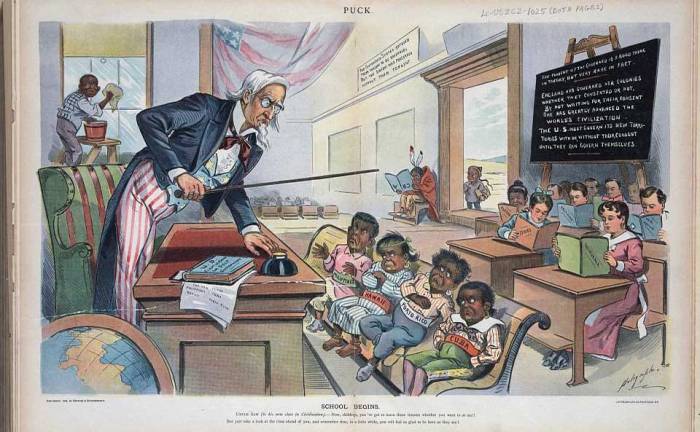Embark on a journey of discovery with the Legacy of American Imperialism Quiz, an immersive experience that unravels the motivations, methods, and lasting consequences of this pivotal era in world history. From the allure of Manifest Destiny to the complexities of modern-day perspectives, this quiz invites you to delve into the intricacies of American imperialism and its profound impact on the global stage.
As you navigate through the quiz, you will encounter thought-provoking questions that challenge your understanding of key events, strategies, and the multifaceted legacy of American imperialism. Engage with historical contexts, analyze diverse perspectives, and gain a deeper appreciation for the enduring influence of this transformative period.
Historical Context of American Imperialism

The late 19th and early 20th centuries marked a period of significant American imperialism, driven by a complex interplay of motivations and goals. Economic expansionism, the pursuit of strategic territories, and a belief in the inherent superiority of American values and institutions were key factors that propelled the United States into an era of global dominance.
Key Events and Territories
- Spanish-American War (1898): Resulted in the acquisition of Puerto Rico, Guam, and the Philippines.
- Annexation of Hawaii (1898): Expanded American influence in the Pacific.
- Open Door Policy (1899-1900): Sought to maintain equal trading opportunities in China.
- Roosevelt Corollary (1904): Declared the United States’ right to intervene in Latin American affairs to protect its interests.
- Panama Canal (1914): Strengthened American control over the Caribbean and Pacific regions.
Manifest Destiny and Its Impact
Manifest Destiny, a widely held belief in the 19th century, asserted that the United States was destined to expand westward across the North American continent. This ideology played a significant role in justifying territorial expansion and the displacement of indigenous populations.
Justification for Expansion
- God-given mission:Many Americans believed they had a divine mandate to spread Christianity and American values.
- Economic opportunity:Expansion provided access to new markets, resources, and land for settlement.
- National security:Controlling strategic territories was seen as essential for protecting American interests.
Consequences for Indigenous Populations
- Displacement and loss of land:Native American tribes were forcibly removed from their ancestral territories.
- Cultural genocide:Government policies aimed to assimilate Native Americans into white society, suppressing their languages and traditions.
- Disease and conflict:European diseases and warfare decimated Native American populations.
Methods of Imperial Control

The United States employed various methods to establish and maintain control over its imperial territories.
Economic Strategies
- Economic dominance:Control over trade, tariffs, and investment ensured economic dependence.
- Plantation system:Forced labor on plantations produced cash crops for export.
- Infrastructure development:Railroads, roads, and ports facilitated economic exploitation.
Political Strategies, The legacy of american imperialism quiz
- Direct rule:Territories were governed by American officials.
- Indirect rule:Local elites were used as intermediaries to maintain control.
- Military presence:Troops were stationed to suppress resistance and maintain order.
Legacy of Imperialism in the 20th Century
American imperialism had profound long-term effects on the United States and its former colonies.
Political Consequences
- Decolonization movements:Imperialism sparked nationalist movements that led to the independence of many colonies.
- Rise of nationalism:Imperialism fostered a sense of American superiority and global responsibility.
- Cold War:The United States’ role as a global superpower during the Cold War was influenced by its imperial legacy.
Economic Consequences
- Economic growth:Imperialism provided access to resources and markets, boosting American economic prosperity.
- Economic dependence:Former colonies became dependent on the United States for trade and investment.
- Resource depletion:Imperial exploitation led to the depletion of natural resources in many colonies.
Contemporary Perspectives on American Imperialism

Today, the legacy of American imperialism continues to be debated.
Ongoing Debates
- Neo-imperialism:Some argue that the United States continues to exert imperial influence through economic and military power.
- Responsibility and apology:There is ongoing discussion about the United States’ responsibility to address the negative consequences of its imperial past.
- Global power dynamics:American imperialism is seen as part of a broader pattern of global power dynamics and competition.
FAQ Resource: The Legacy Of American Imperialism Quiz
What were the primary motivations behind American imperialism?
Economic expansion, geopolitical ambitions, and the belief in Manifest Destiny were key driving forces.
How did Manifest Destiny justify American territorial expansion?
It presented the expansion as a divine mission to spread American values and institutions across the continent.
What methods did the United States employ to establish imperial control?
Military force, economic exploitation, political manipulation, and cultural assimilation were among the tactics used.
What were the long-term consequences of American imperialism?
Political instability, economic dependence, social upheaval, and the rise of nationalist movements were some of the lasting effects.
How do contemporary perspectives on American imperialism vary?
Views range from acknowledging the benefits of modernization to criticizing the exploitation and oppression associated with imperialism.